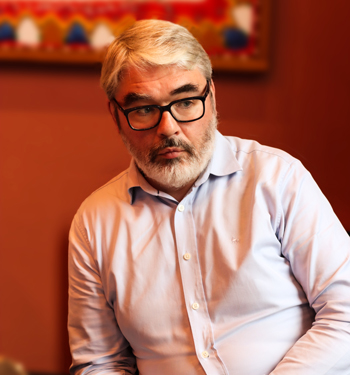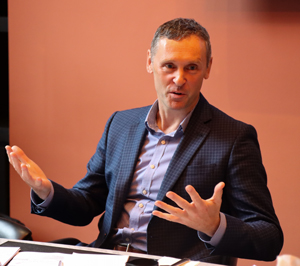Rather than think of net zero as a mandatory target that we must reach reluctantly, businesses and Government should see it as a huge opportunity for investment and jobs.
The date when Ireland is committed to reaching net zero — 2050 — seems like a long way away. In reality, it’s frighteningly close. For businesses, this is a sobering thought.
Reaching net zero targets in time
Organisations that have been moving slowly but surely to cut their carbon emissions have suddenly woken up to the fact they are now just six years away from 2030 — a milestone on the road to net zero.

Meanwhile, businesses such as Schneider Electric — which drives digital transformation to improve its customers’ sustainability and efficiency — have a lot of infrastructure to build in a short time to help them get there.
“Essentially, everyone has been used to moving at a conservative pace,” says Chris Collins of Schneider Electric. “We’ve all been running a marathon, but now, we need to sprint. That’s the challenge — but it’s not unique to Ireland. Every country is having to deal with it.” Apart from the threat of climate change, new geopolitical realities will focus minds, he believes.
Jobs and investment opportunities presented by net zero
Justin Moran at Wind Energy Ireland, the Irish wind industry body, thinks that a more strategic approach is needed for net zero. “If the target is net zero at 2050, then at some point between now and then, we need to get to a zero-carbon electricity system,” he says. “That’s the building block to decarbonise heat and transport. What’s the Irish Government’s target for that, and the plan to get there? At the moment, we don’t know.”
Attitudes to net zero also need to change. Rather than thinking of it as a looming mandatory target to reach reluctantly, we should start to view it as a huge opportunity for investment and jobs.
The problem is that Ireland — and Europe, more widely — is not currently building enough renewable tech. “Earlier this year, the EU published its Net-Zero Industry Act,” explains Diana Vaz of Irish Manufacturing Research . “This proposal aims to boost the manufacture of green technologies in Europe, which is important because the region is an importer of green tech. We all know how vulnerable we become if we rely on materials that are not sourced locally. It’s the same with energy technologies.”
Businesses and consumers can make big energy savings

The EU also approved an Energy Efficiency Directive (adopted in 2012 and updated in 2018 and 2023), which requires member states to introduce energy efficiency obligation schemes to reach a reduction in final energy use of 1.5% per year.
Ireland’s obligation scheme originally came into force in 2014. Liam Faulkner of Strategic Power Connect, a company that helps major energy users become more sustainable, is a big supporter. Even so, he admits that efficiencies can be difficult to achieve because energy challenges aren’t all the same. “We’ll identify efficiency problems in one company, which might take three or four months to diagnose,” he says. “Then, we’ll go into another company, and their problems will be totally different.”
Yet, everyone has to start their net zero journey somewhere. “It’s amazing how many consumers don’t even understand how they’re using electricity,” says Collins. “So, install a smart thermostat, look at your usage and then you can identify where there is waste in the system. It’s the same for businesses. There are simple things we can all do right now that will be critical to help with the energy transition.”
Kevin O’Donovan at Statkraft, Europe’s largest generator of renewable energy, agrees. “We have to bring more urgency if we really want to tackle climate change, particularly around actions that are relatively easy to put in place compared to some of the difficult actions we have to take in the future.”
Future of Energy contributors
Chris Collins, Country President Ireland, Schneider Electric
Kevin O’Donovan, Managing Director, Statkraft Ireland
Justin Moran, Director of External Affairs, Wind Energy Ireland
Liam Faulkner, CEO, Strategic Power Connect
Diana Vaz, Renewable Research Technologist, IMR

